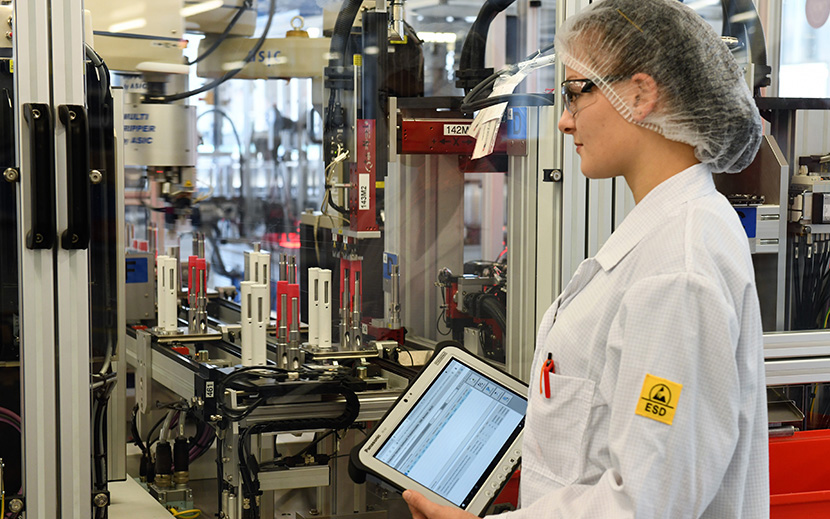
Digital Manufacturing in Medical Technology with SAP MES
Respond flexibly to dynamic requirements
Ypsomed Holding AG is a Swiss listed company with headquarters in Burgdorf. Through a global network of production sites, subsidiaries and sales partners, approximately 1,900 employees generate annual sales equivalent to around 400 million euros. The continuing success is driven by the two umbrella brands: "mylife Diabetescare" for the manufacture and sale of infusion and blood glucose monitoring systems, among others, and "Ypsomed Delivery Systems" for pen and auto-injectors, among others.
With the production of injection systems, Ypsomed pursues the goal of making self-treatment a matter of course in the lives of patients. In doing so, the company must take into account numerous obligatory requirements in the medical technology environment, which is subject to validation. These requirements were met with the old MES, which had been in use for 20 years. Due to the "end-of-life" decision of the existing system, Ypsomed decided to introduce SAP ME (SAP Manufacturing Execution), the SAP standard software for discrete production, as part of a digitalization offensive.
Legacy system no longer meets requirements
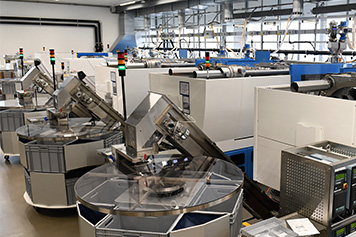
Since self-medication is always primarily a matter of trust in the products and the associated reputation of the provider, they cannot avoid seamlessly documenting the production process in accordance with validation regulations. Changing and new business processes could not be easily mapped in the existing system. The manual effort required in the course of paper-based production was correspondingly high. The situation was further complicated by a proprietary system landscape caused by several stand-alone in-house developments and interfaces. In addition, the MES, which had been set to "end-of-life" in 2023, created pressure to act. Continued support was thus out of the question.
"The challenges we faced were at the same time a great opportunity to future-proof the processes and introduce efficient paperless production," reports Frank Wüstenberg, Project Manager at Ypsomed. System-supported process management was to help avoid errors and reduce effort. "The decision in favor of SAP ME was made at that time because the solution is very future-proof for us," says Wüstenberg. "We have very good ERP integration, high standard coverage, and the MES is of course release and rollout ready. A highly configurable system and compatibility with S/4HANA were also important for us. We found that with SAP ME."
To maintain product safety and traceability, automated process interlocking and control were to contribute in addition to seamless digital documentation of the manufacturing progress. With SAP ME as the central MES, it will also be possible in the future to use key figures or key performance indicators (KPIs) as a basis for further productivity increases. Last but not least, the prospect of vendor independence was also a decisive aspect. This is because the successive internal development of Ypsomed's own SAP ME expertise makes it possible to provide in-house services such as rollouts and system enhancements, thus reducing external services to a minimum.
In-depth IT and process understanding required
In the selection process, IGZ, the SAP project house for production and logistics from Falkenberg, was awarded the contract as consulting and implementation partner. "IGZ convinced us with its project references, which point to many years of experience in the production environment with various companies," says Frank Wüstenberg, explaining the decision. "Further insights were gained in the direct exchange of experiences with other SAP ME customers at the IGZ Day Forum and ultimately also in the context of the deployment analysis carried out in advance. Thanks to this analysis, we not only found in-depth know-how, but also received reliable budgeting and scheduling for the project."
Pilot project for the injection molding and assembly processes
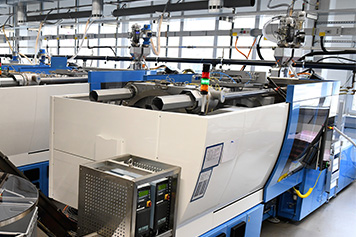
In a first step, IGZ was commissioned with the SAP MES implementation support for the pilot project in Solothurn. Instead of a big bang, the existing legacy MES was to be replaced step by step to ensure continued operation, i.e. to continue to function for a transitional period. The pilot project focused on the self-contained manufacturing processes "Injection Molding" and "Assembly Pen & Autoinjector". At the same time, the holding and quality control points required in the highly sensitive environment where validation is mandatory, so-called batch record reviews, had to be mapped in SAP ME. Validated master data records from SAP ERP and their system-supported distribution to the injection molding machines by the MES were also incorporated. In this way, Ypsomed and IGZ have realized a continuous vertical system integration from the ERP via the MES to the machines.
Implementation of the manufacturing process injection molding ...
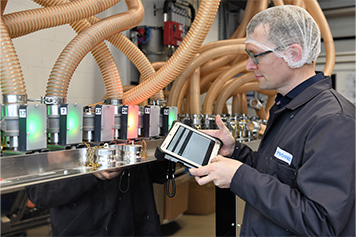
At the start of the "injection molding" manufacturing process, the raw materials in the granulate warehouse are first scanned via a mobile dialog. The batch stored is used for traceability in the further production process. At the coupling station, the pipes for feeding the granulate to the injection molding machine are connected. SAP ME checks the status of the batch, the status of the machine equipment and the correct linkage. During the subsequent setup process of the injection molding machine for the next job, the MES provides system-supported process control. In this process, the required molds as well as the batch-managed components used are checked and the validated master parameter data set is sent to the system.
Furthermore, the production employee must perform so-called acceptances in SAP ME, i.e. confirm quality-relevant process points. SAP ME then triggers the printing of the material identification cards and the generation of inspection lots. In parallel, the tools and parts list components are checked. The final quality control certifies that production has been carried out exactly in accordance with currently applicable regulations.
... and assembly by means of SAP ME
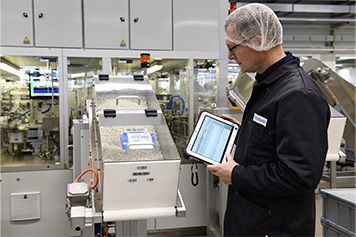
The assembly line contains a large number of feed points (material slots) via which components are prepared for the production order. These are also validated with the material using mobile scan routines. This ensures batch traceability while ensuring that the required material components have been set up according to the bill of materials. During physical set-up, the production worker has clear digital work instructions available in the MES.
Furthermore, the entire manufacturing process is processed in the system. As with injection molding, SAP ME records production times and quantities. With machine data recording and acceptance confirmations, purely digital production documentation is achieved - keyword "paperless production". Production-accompanying quality assurance measures also take place in assembly. The strict process interlock with the quality-relevant breakpoints is dynamically integrated into the SAP ME process for each product.
System-supported safe production worker guidance - stationary and mobile
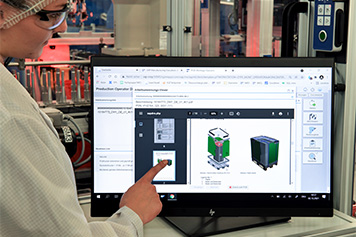
The intuitive operator interfaces, or PODs (Production Operator Dashboards), run on industrial tablets with integrated scanners. Thanks to a dynamic and flexible SAP ME configuration concept, they are optimally tailored to Ypsomed's requirements. All the information that the production operator needs for his work on the system can be found in these stationary terminals. Particularly noteworthy is the function of strict SAP ME process and order control via SAP ME acceptances. In some cases, these must also be carried out using the dual control principle. For example, the line clearance concept specifies the check that the line has been handed over cleanly after completion of a preceding order. This must always be done by two employees and confirmed in the MES.
In addition, user-friendly, intuitive mobile SAP UI5 dialogs have been implemented for production employees. They run on smartphone-sized devices as well as on scanners and are primarily used to efficiently record, validate and link component batches to the assembly line and to the SAP ME production order. This means that production staff always have mobile solutions at their fingertips in order to be able to carry out the corresponding component registrations on the shop floor or at the extensive plant. The system can be used in the injection molding area as well as in the assembly area, for example in the granulate warehouse or at the coupling station.
Seamless vertical integration ERP - MES - Shopfloor
The integration of master and transaction data between SAP ME and SAP ERP is made possible by a variety of standardized integration scenarios. The greater challenge, however, was to connect the complex systems from special machine construction to SAP ME. YPSOMED and IGZ solved this task by means of a uniform, modular integration platform, which Ypsomed can use to integrate both existing old and new plants into the overall ME process.
As a central module, SAP Plant Connectivity (PCo) synchronizes communication between SAP ME and the store floor systems. All store floor use cases are mapped in it at OPC UA data level. One level below, an edge system standardizes the communication processes to assembly systems of various manufacturers in special machine construction and, via the Euromap protocol, to systems in the injection molding area. This level allows varying data structures, interfaces and protocols to be merged into a standardized OPC UA structure.
Fit for new tasks in the environment requiring validation
Throughout the course of the project, a continuous transfer of knowledge took place according to a "train-the-trainer" principle. This methodology, which IGZ has always favored, meets Ypsomed's desire to be able to carry out future rollouts under its own direction as far as possible. However, the proven know-how in the implementation of SAP projects in the environment requiring validation - including GMP and GxP - as well as IGZ's extensive experience in the area of machine integration and OPC-UA also proved to be advantageous for the medical technology specialist.
The complete digital documentation of the batch-controlled production process fulfills all legal regulations. Errors are ruled out thanks to plausibility measures and system-supported process control/interlocking, and the in-process inspections in conjunction with paperless production provide impressive proof of the high quality level of the manufactured pens and auto-injectors. Mobile dialogs have also significantly increased work ergonomics and efficiency, and there is cross-site transparency and process reliability.
The approaching home stretch continuously in sight
"With SAP ME, we now have a future-proof MES that covers around 90 percent of our requirements as standard and can be perfectly integrated into our existing system landscape," summarizes Frank Wüstenberg. "A dynamic approach to order processing also puts us in the comfortable position of being able to flexibly adapt changing manufacturing processes in SAP ME in the future."
Nevertheless, the connection of existing machine interfaces and the replacement of an existing MES is quite a demanding project, which, however, has been mastered excellently with professional support from IGZ. "The fundamental topics for us as a medical technology company in an environment requiring validation, such as complete traceability, process interlocking and continuous digital documentation of the entire manufacturing process, were very well covered by SAP ME," says Mr. Wüstenberg with satisfaction.
Further rollouts based on the template created in the pilot project to Ypsomed's remaining Swiss sites and the Schwerin plant are on the agenda for 2022. A rollout to other business processes is also planned, including the introduction of SAP ME in the printing area. The experience gained to date will be incorporated into additional optimization measures. As a final milestone, the old system can be deactivated once all relevant business processes have been integrated into SAP ME.
Back to overview

